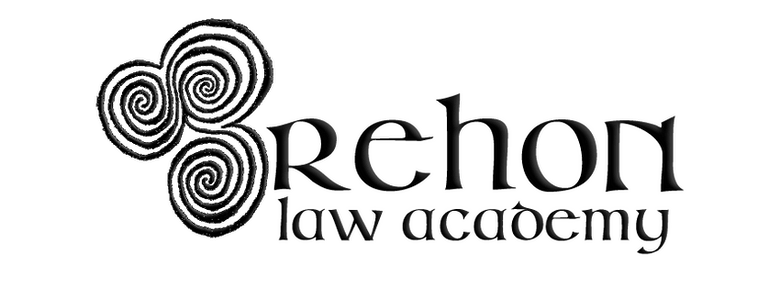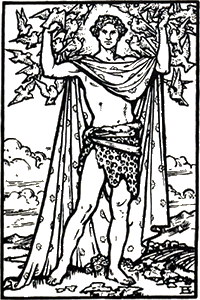Long ago, the people of Ireland were internationally renowned for their love of law and their intricate justice system. Law was the articulation of fairness and the embodiment of justice, the application of the law to real scenarios was seen as a manifestation of justice in action, an affirmation of the natural harmonising order of the cosmos. It was Sir John Davies, an Englishman who was instrumental in the final abolishment of Ireland native laws, that said: “There is no nation under the sun that does love justice better than Irish” and this desire for justice permeated the culture, it is sung about in our myth, and it reflects the nature and attitudes of our ancestors.
While we call them the Brehon Laws our ancestors would have been used to knowing them as the Fénechas - the Law of the Féine or ‘free land-tillers’. Unlike the complexities of today’s legal system the law was knowable, it was felt within as a sense of fairness and this connection was nurtured by the clan or family throughout a child’s life with a view to securing the family honour.
With the ambition of creating a fair society based on principles of justice, truth, and a code of honour, the laws started with the people and came from the bottom up, not from the top down. Customs became laws but the laws were changeable in accordance with changes in customs; ultimately determined by the people using them. Importantly there was no executive body ‘enforcing’ or merely enacting laws or judgements upon the people, there was no police force or prison system (See: Looking Back Going Forward – Rethinking Crime and Punishment in Ireland for arguments for penal reform using the Brehon Laws).
The role of the Brehon (or Breitheimh translated as ‘Judge’), therefore, was to impartially determine the fairest outcome according the known and long established customs of the people. He was an arbiter, desirous of settling his neighbours’ disputes and qualified to do so, his judgement served to guide the parties towards a point of harmonious reconciliation. But while Brehons were traditionally trained to oversee cases, in reality anyone’s judgement could be sought. Unlike our modern system where one is stuck with whichever judge they get, in ancient Ireland people were free to choose their own judges. Naturally, those who were the most fair, just, and in tune with the customs would stand out as desirable arbitrators.
This ability to find the true judgement was honoured and admired by society in general and this leads us on to the story of how the young boy Cormac Mac Airt was recognised as a rightful king of Tara by virtue of his ability to find the ‘true judgement’.
When Cormac mac Art, the rightful heir to the throne of Ireland, was a boy, he lived at Tara in disguise; for the throne was held by the usurper Mac Con, so that Cormac dared not reveal his identity.
There was at this time living near Tara a female brewy, named Bennaid, whose sheep trespassed on the royal domain, and ate up the queen's valuable crop of glaisin [glasheen] or woad-plants for dyeing.
The queen instituted proceedings for damages; and the question came up for decision before the king, who, after hearing the evidence, decided that the sheep should be forfeit in payment for the glaisin. "Not so," exclaimed the boy Cormac, who was present, and who could not restrain his judicial instincts: "the cropping of the sheep should be sufficient for the cropping of the glaisin—the wool for the woad—for both will grow again."
"That is a true judgment," exclaimed all: "and he who has pronounced it is surely the son of a king" — for kings were supposed to possess a kind of inspiration in giving their decisions. And so they discovered who Cormac was, and in a short time placed him on the throne,
after deposing the usurper.
(See: P. W. Joyce; A Smaller Social History of Ancient Ireland, 1906, Chapter IV, ‘6. The Administration of Justice’. Available here)
"A true judgment, a true judgment," cried all the folk that were present in the place; "a very king's son is he that hath pronounced it." And they murmured so loudly against mac Con that his druids counselled him to quit Tara lest a worse thing befall him.
So he gave up the sovranty to Cormac and went southward into Munster to rally his friends there and recover the kingdom, and there he was slain by Cormac's men as he was distributing great largesse of gold and silver to his followers, in the place called The Field of the Gold.
So Cormac, son of Art, ruled in Tara and was High King of all Ireland. And the land, it is said, knew its rightful lord, and yielded harvests such as never were known, while the forest trees dripped with the abundance of honey and the lakes and rivers were alive with fish.
So much game was there, too, that the folk could have lived on that alone and never put a ploughshare in the soil. In Cormac's time the autumn was not vexed with rain, nor the spring with icy winds, nor the summer with parching heat, nor the winter with whelming snows. His rule in Erinn, it is said, was like a wand of gold laid on a dish of silver.
(See: The Judgement of Cormac.
www.luminarium.org/mythology/ireland/cormacjudge.htm)
This idea of ‘true judgement’ and the quest for fairness is something that sits within all of us - it can be recognised, fostered, and nurtured to become stronger and we too can exhibit the judgement of a brehon or the judgement of a king in the same manner as our ancestors.
Learn more about Ancient Ireland Online!
40 Lessons over 4 Hours of Content
See also:
How Cú Chulain Got His Name - Restitution in Irish Mythology
Three Things a False Judge Deserves
Irish Manuscripts: The Book of Aicill














